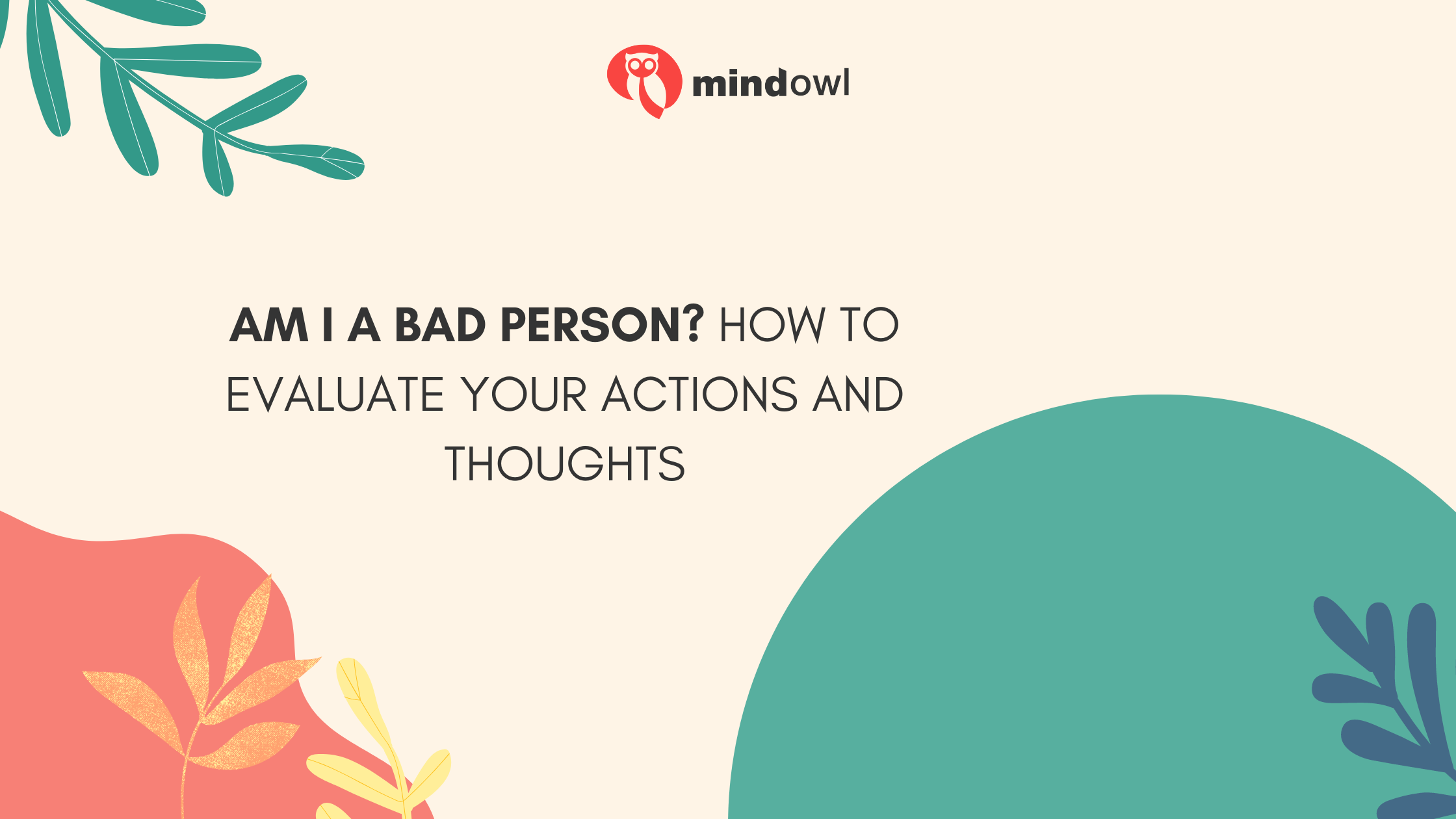Have you ever found yourself wondering, “Am I a bad person?” If yes, you’re not alone. Many people question their actions and how they affect those around them at some point in their lives.
This blog post aims to peel back the layers surrounding the concept of being labelled as ‘bad’ or ‘good’. We’ll look at what truly defines our moral compass and explore indicators of negative traits within ourselves.
More importantly, we’ll guide you through understanding these traits and how one might shift towards positive change for personal growth.
Key Takeaways
- The “Am I a Bad Person?” quiz helps you think about your actions and their effects on others. It looks at things like kindness and responsibility but isn’t perfect.
- Understanding why you feel bad involves looking into deep feelings of regret or guilt. Learning from these emotions is key to growing as a nicer person.
- Some negative traits include lacking empathy, acting irresponsibly, being cruel to animals, and manipulating people. These behaviours can hurt relationships and lead to loneliness.
- Reflecting on the consequences of what you do shows how it impacts those around you. This thinking helps build stronger connections with friends and family.
- If feeling bad about yourself becomes too much, talking to a therapist can help. They teach ways to change negative thoughts and show how self-love makes mental health better.

Understanding the Concept of Being ‘Bad’
The idea of being ‘bad’ ties closely with how well we understand ourselves and our feelings towards others. If you often ask yourself, “Am I a bad person?” this shows you’re thinking deeply about your actions and their impacts.
Self-awareness and empathy play big roles here. People sometimes see minor mistakes as signs of a flawed character. Yet, it’s key to look deeper. Low self-esteem or attention difficulties might be the real culprits behind these actions.
Feeling like you’ve done wrong can come from regret or other tough emotions. To truly grasp why we feel this way, digging into the reasons behind these feelings is crucial. It’s not just about the immediate guilt or sadness; understanding comes from recognising what led us to act in ways we later wish we hadn’t.
Indicators of Negative Personality Traits
Psychopathy
Psychopathy is characterized by a profound lack of empathy and remorse for others. Psychopaths exhibit shallow emotions, and callousness, and often lead impulsive, irresponsible lifestyles marked by antisocial behaviour and criminal tendencies. They use superficial charm and manipulation to exploit others for personal gain, lacking realistic long-term goals or a moral compass.
Psychopaths are often described as having a “mask of sanity” – they can appear normal but underneath lack the ability to form genuine emotional bonds or care about the consequences of their actions on others. Their behaviour is driven by selfishness, impulsivity, and a disregard for social norms.
Sadism
Sadism involves deriving pleasure, gratification or satisfaction from inflicting pain, humiliation or distress upon others. Sadists show a vicious streak and an intentional desire to harm others, often lacking remorse or guilt. Their cruelty can manifest in different ways like explosive outbursts of rage, tyrannical dominance over others, or enforcing compliance through fear.
Sadists are aroused by the suffering of others and may reenact sadistic fantasies through physical, verbal or emotional abuse. They lack empathy and are unable to experience the normal human emotions of compassion or concern when confronted with someone else’s pain.
Narcissism
Narcissists are characterized by a grandiose, inflated sense of self-importance and entitlement. They are preoccupied with fantasies of unlimited success, power, beauty and brilliance. Narcissists lack empathy, behaving arrogantly while being unwilling to recognize or identify with the needs and feelings of others.They exploit interpersonal relationships, taking advantage of others to achieve their own goals. Narcissists have an exaggerated sense of self-admiration and crave constant attention and admiration from others. Any perceived criticism or defeat is reacted to with anger, humiliation or disdain.
Machiavellianism
Machiavellianism refers to a cynical worldview and a cold, pragmatic approach to achieving goals through manipulation and deception of others. Machiavellians prioritize money, power and status over ethical considerations or developing meaningful relationships. They lack morality and authentic empathy, instead using cunning and a willingness to exploit others for their own ends.Machiavellians are masters of impression management, tailoring their behavior to appear agreeable while hiding their selfish motives. They are emotionally detached and view personal interactions through a lens of potential opportunities for personal gain. Loyalty and genuine concern for others are seen as weaknesses.
‘Am I a Bad Person?’ Quiz
Take the quiz to assess your behaviour and identify negative personality traits that might need attention. Discover how certain indicators can shed light on areas for personal growth.
Overview of the Quiz
This quiz looks at kindness, responsibility, and more to see if someone might be a bad person. Remember, a test online can’t know you fully. Still, the questions make you think about your actions and how they affect others.
It’s not perfect but gives clues on where to improve.
Be careful with online quizzes. Some are scams trying to get information from you. Always check who made the quiz and what they will do with your answers. The results should not change how you see yourself too much.
Key Questions and Their Implications
Diving headfirst into the heart of our quiz, we’ve designed a series of questions aimed at sparking deep self-reflection. These questions are more than just surface-level inquiries; they’re a gateway to understanding the nuances of our actions and their impacts on others around us. Below, you’ll find a table summarizing key questions from our quiz and what each question hints at regarding your personality and behaviour.
| Question | Implication |
|---|---|
| How often do you find yourself considering the feelings of others before acting? | This question probes your ability to empathize, a crucial trait often absent in those exhibiting negative personality aspects. |
| Have you ever taken responsibility for a mistake, even when it might have been easier to blame someone else? | Willingness to own up to errors showcases integrity and accountability, contrasting sharply with irresponsible behavior. |
| How do you react to seeing an animal in distress? | Your reaction to animals’ suffering speaks volumes about your capacity for compassion, an element lacking in cruel individuals. |
| Think about a time you wanted something from someone. How did you go about obtaining it? | Exploring your methods of influence reveals whether you lean towards genuine relationships or manipulative tactics. |
Each question is a stepping stone towards self-awareness. They don’t just scratch the surface but delve deeper, asking you to look within and assess the nature of your actions and their wider implications.
Remember, the aim here isn’t to tag someone as ‘good’ or ‘bad’ outright. That would be overly simplistic and ignore the complex realities of human behaviour. Instead, these questions serve as a mirror, reflecting the choices we make and encouraging us to consider their effects on our surroundings. It’s about acknowledging the shades of grey in our personalities and striving for personal growth and understanding.
Acknowledging and Addressing Negative Behaviours
Negative behaviours can lead to various consequences, affecting not only oneself but also others. It is important to reflect on the impact of our actions and consider the potential outcomes.
Assessing how our behaviour may affect those around us is crucial for making positive changes. Understanding the ripple effect of our actions helps in cultivating a more compassionate and empathetic approach towards others. This introspective analysis aids in recognising when negative behaviours might hurt people and guides us towards making amends.
Practising self-acceptance
Practising self-acceptance involves reframing negative beliefs about oneself. It’s about welcoming all feelings, positive or negative, and being comfortable with emotional difficulties.
Negative self-talk can erode self-acceptance and it’s important to embrace all parts of oneself in order to truly love oneself. Positive psychology and therapy can help individuals learn to accept themselves fully, including the good, the bad, and the ugly.
Embracing one’s whole self is crucial for mental wellbeing. Challenging negative beliefs through writing down and challenging them helps create a more positive self-image. The ultimate goal is to love every part of oneself deeply.
Seeking Help from a Therapist
If you’re struggling with feelings of being a bad person, seeking help from a therapist can provide the support and guidance needed to address and overcome these emotions. Therapists can assist in identifying and challenging negative core beliefs, leading to greater self-awareness and personal growth.
Through cognitive behaviour therapy (CBT) or emotional validation techniques, therapists can teach individuals to change negative thought patterns and beliefs about themselves, paving the way for improvement.
Furthermore, therapy can help individuals healthily work through regret and remorse, promoting positive decision-making, and resilience against trauma effects like PTSD or anxiety, as well as enhancing interpersonal relationships.
Conclusion
Discover if you might need to improve your behaviours using the ‘Am I a Bad Person’ quiz. Acknowledge areas for change and work towards becoming a better person. Seek help from a therapist if needed, and practise self-acceptance while considering the consequences of actions.
FAQs
1. What is the “Am I A Bad Person Quiz”?
The quiz is a set of questions designed to help you reflect on your actions and feelings. It delves into your moral code, regrets, and how you treat others—aiming to shed light on whether what you’ve done makes you a bad person or if everyone just makes mistakes.
2. Can making mistakes make me a bad person?
Everyone stumbles now and then—it’s part of being human. What matters more is recognising those mistakes, feeling truly sorry, and striving to be better.
3. How can this quiz help improve my mental health?
Engaging in introspection through questions like these can highlight areas for personal growth and self-awareness—key steps towards improving one’s mental health.
4. Does feeling guilty after hurting someone mean I’m narcissistic?
Guilt can be a sign that you care about how your actions impact others—a far cry from narcissism where empathy tends to lack. It shows you have the capacity for empathy and desire to mend things if possible.
5. Why do psychologists suggest taking quizzes like this?
Quizzes provoke thoughtfulness about our actions, motives, values—and yes—even our dark sides; they’re tools for self-discovery leading toward positive change.
6. What should I do if I discover negative traits about myself through this quiz?
Firstly—don’t panic! Discovering areas for improvement is actually good news because now you know what needs work. Seeking advice from health professionals or engaging in psychotherapy could offer guidance on cultivating healthier habits while fostering personal growth.
MindOwl Founder – My own struggles in life have led me to this path of understanding the human condition. I graduated with a bachelor’s degree in philosophy before completing a master’s degree in psychology at Regent’s University London. I then completed a postgraduate diploma in philosophical counselling before being trained in ACT (Acceptance and commitment therapy).
I’ve spent the last eight years studying the encounter of meditative practices with modern psychology.

